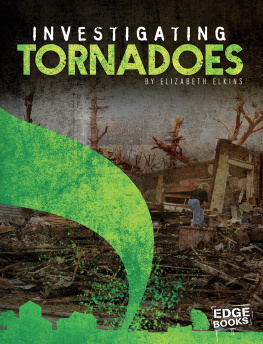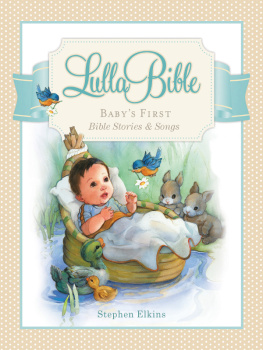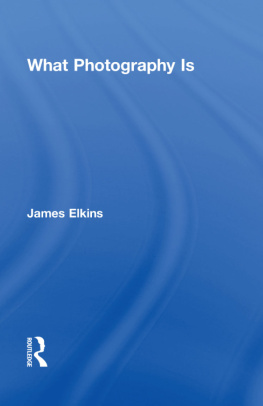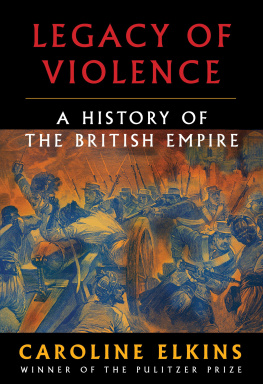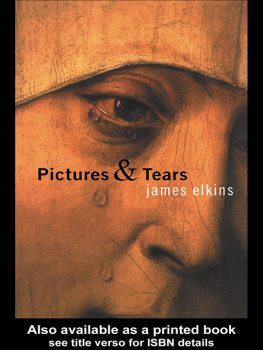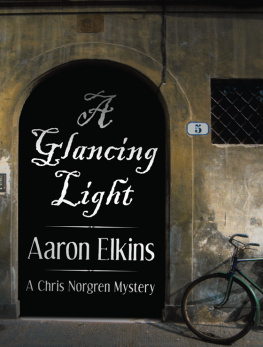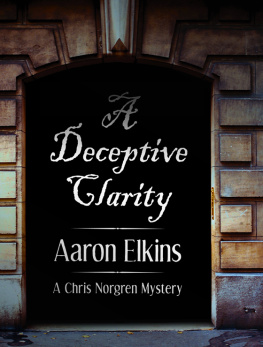Elkins Jeremy - Truth and democracy
Here you can read online Elkins Jeremy - Truth and democracy full text of the book (entire story) in english for free. Download pdf and epub, get meaning, cover and reviews about this ebook. City: Philadelphia, year: 2012, publisher: University of Pennsylvania Press, genre: Politics. Description of the work, (preface) as well as reviews are available. Best literature library LitArk.com created for fans of good reading and offers a wide selection of genres:
Romance novel
Science fiction
Adventure
Detective
Science
History
Home and family
Prose
Art
Politics
Computer
Non-fiction
Religion
Business
Children
Humor
Choose a favorite category and find really read worthwhile books. Enjoy immersion in the world of imagination, feel the emotions of the characters or learn something new for yourself, make an fascinating discovery.

- Book:Truth and democracy
- Author:
- Publisher:University of Pennsylvania Press
- Genre:
- Year:2012
- City:Philadelphia
- Rating:4 / 5
- Favourites:Add to favourites
- Your mark:
- 80
- 1
- 2
- 3
- 4
- 5
Truth and democracy: summary, description and annotation
We offer to read an annotation, description, summary or preface (depends on what the author of the book "Truth and democracy" wrote himself). If you haven't found the necessary information about the book — write in the comments, we will try to find it.
Truth and democracy — read online for free the complete book (whole text) full work
Below is the text of the book, divided by pages. System saving the place of the last page read, allows you to conveniently read the book "Truth and democracy" online for free, without having to search again every time where you left off. Put a bookmark, and you can go to the page where you finished reading at any time.
Font size:
Interval:
Bookmark:
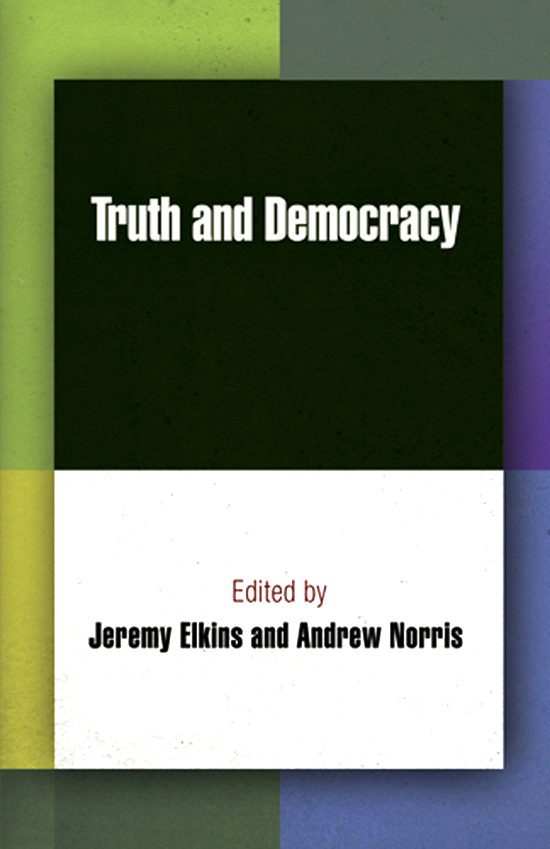
Truth and Democracy
DEMOCRACY, CITIZENSHIP, AND CONSTITUTIONALISM
Rogers M. Smith and Mary L. Dudziak, Series Editors
Edited by
Jeremy Elkins and Andrew Norris

Copyright 2012 University of Pennsylvania Press
All rights reserved. Except for brief quotations used for purposes of review or scholarly citation, none of this book may be reproduced in any form by any means without written permission from the publisher.
Published by
University of Pennsylvania Press
Philadelphia, Pennsylvania 19104-4112
www.upenn.edu/pennpress
Printed in the United States of America on acid-free paper
10 9 8 7 6 5 4 3 2 1
Library of Congress Cataloging-in-Publication Data
Truth and democracy / edited by Jeremy Elkins and Andrew Norris. 1st ed.
p. cm. (Democracy, citizenship, and constitutionalism)
Includes bibliographical references and index.
ISBN 978-0-8122-4379-6 (hardcover : alk. paper)
1. DemocracyPhilosophy. 2. TruthPolitical aspects. 3. Political ethics. I. Elkins, Jeremy. II. Norris, Andrew, 1960 III. Series: Democracy, citizenship, and constitutionalism.
JC423.T725 2012
321.8dc23
2011025503
For our daughters
It is not foolish to believe that any social and political order which effectively uses power, and which sustains a culture that means something to the people who live in it, must involve opacity, mystification, and large-scale deception. Reasonable people can believe... that human beings cannot live together effectively, at least on any culturally ambitious scale, if they understood fully what they are doing. It is not necessarily foolish to believe these things, but they may not be true, and we can still live in the hope... that they are not.
Bernard Williams, Truth and Truthfulness
Jeremy Elkins and Andrew Norris
Harold Pinter
Jeremy Elkins
Linda M. G. Zerilli
Robert Post
Wendy Brown
Andrew Norris
Michael P. Lynch
William A. Galston
David Couzens Hoy
Jane Bennett
Martin Jay
Bernard Yack
Frederick Rosen
Rogers M. Smith
Nadia Urbinati
Joshua Cohen
David Estlund
Josiah Ober
Robert Westbrook
Jeremy Elkins and Andrew Norris
WE LIVE IN a political culture that is deeply ambivalent about truth. On the one hand, it is said that there are basic truths on which our politics must be grounded. We are told, for example, by the right (mostly) that a certain version of liberal democratic capitalism is the end to which all of human history has been directed, and that the abandonment of the belief in a Judeo-Christian god and adherence to his universal moral commandments leads to radical relativism; while on the left (mostly) we have witnessed the growth of a universal human rights discourse that holds certain truths to be self-evident, as well as a renewed reverence for the natural sciences as a paradigm of rational inquiry and a bastion of truth against superstition and faith. Yet at the same time, we hear from various quarters that the very idea of political truth is necessarily tyrannical or hegemonic. And so, for example, from the right comes the insistence that any public valuation of goods, even if concluded through a democratic process, is inherently authoritarian, while from the left we are told that truth-talk stands as a threat to the very possibility of cultural and epistemic pluralism.
There are, no doubt, many reasons for this ambivalence. Surely the skepticism about or dismissal of truth is in part a response to some of the claims that have sometimes been made for and about truthabout its nature, about It is hard to maintain that it makes no difference how attentive we are to the specific conditions of the world that we seek to affect, or that the quality of the decisions that we make is wholly unrelated to the strength of the evidence behind them and the care of the analysis underlying them. And though there will obviously always be differences of judgmentabout the evidence itself, about what to do about it, and so oneven with respect to the political-philosophical differences that come into play, most will believe that at least their own views are based on truthful (if contested) propositions about the world.
Yet the anxiety about talk of truth remains great: that once any such talk is allowed through the door, it must bring with it a history of metaphysical baggage and a future of political domination. In the academy, this anxiety has perhaps been greatest in the humanities and in political theory, where many have responded to it by either rejecting or avoiding the whole topic. John Rawls and many of those who have followed in his path have, by and large, taken the latter tack and explicitly put aside questions of truth on the grounds that not doing so will undermine the possibility of consensus on fundamental political principles and encourage the imposition of comprehensive doctrines, while many of those influenced by poststructuralism have treated the concern with truth as a threat to plurality and as bound to the dangerous utopian fantasy of overcoming political agonism. Appeals to truth are thus said, on the one side, to threaten consensus and, on the other, to undermine a healthy dissensus. More fundamentally, many worry that concern with questions of truth suggests a return to the idea of a true world attainable [only] for a man who is wise, pious, virtuous, threatening that part of the Nietzschean (and following that, the Heideggerian and Arendtian) project of recovering the world of appearance from its Platonic denigration.
But for Williams, as for other critics of (what he dubbed) the truth deniers, the problem was not merely conceptual and the question by no means idle. The neglect of truth, as Williams put it, had significant consequences both for real politics and for the humanities. We share that view. The volume we have assembled is concerned with real politicsthat term taken broadly to include already within it ordinary reflections on political life. It is also concerned with the discipline of political theory, particularly insofar as the kinds of questions that it asks might fairly be thought of as continuous with the kinds of questions and reflections that members of a polity might, at least in principle, engage in with respect to it.
The broadest question that motivates this volume is whether our politics and political reflections should be concerned with truth at all. But there is also a second, more complex question: the question not of whether but of how truth should matter. And while the volume itself (in contrast to a few of the essays within it) rests on an affirmative answer to the first of these questions, it does not present a single answer to the second. Nonetheless it rests on the assumptions that a concern with the latter question itself matters for our politics; that the character of our politics depends in part on what kinds of truthful inquiries it promotes and how it deals with various kinds of disputes about truth; and that the question of how truth ought to come into play in our politics is an important political and not merely theoretical question. The volume as a whole, apart from any of the particular reflections on these questions offered in the essays it collects, is intended to reopen the question of truth and its place in political life to more sustained attention than it has in general received within the discipline of political theory. It grew out of the belief that, whatever may be said about particular claims that have been made about or in the name of truth, a serious engagement with the problems of social life cannot do without questions of truth; that questions about truth are inevitable in any society that takes politics seriously; and that questions of truth are not adequately resolved by dispensing with them.
Font size:
Interval:
Bookmark:
Similar books «Truth and democracy»
Look at similar books to Truth and democracy. We have selected literature similar in name and meaning in the hope of providing readers with more options to find new, interesting, not yet read works.
Discussion, reviews of the book Truth and democracy and just readers' own opinions. Leave your comments, write what you think about the work, its meaning or the main characters. Specify what exactly you liked and what you didn't like, and why you think so.


